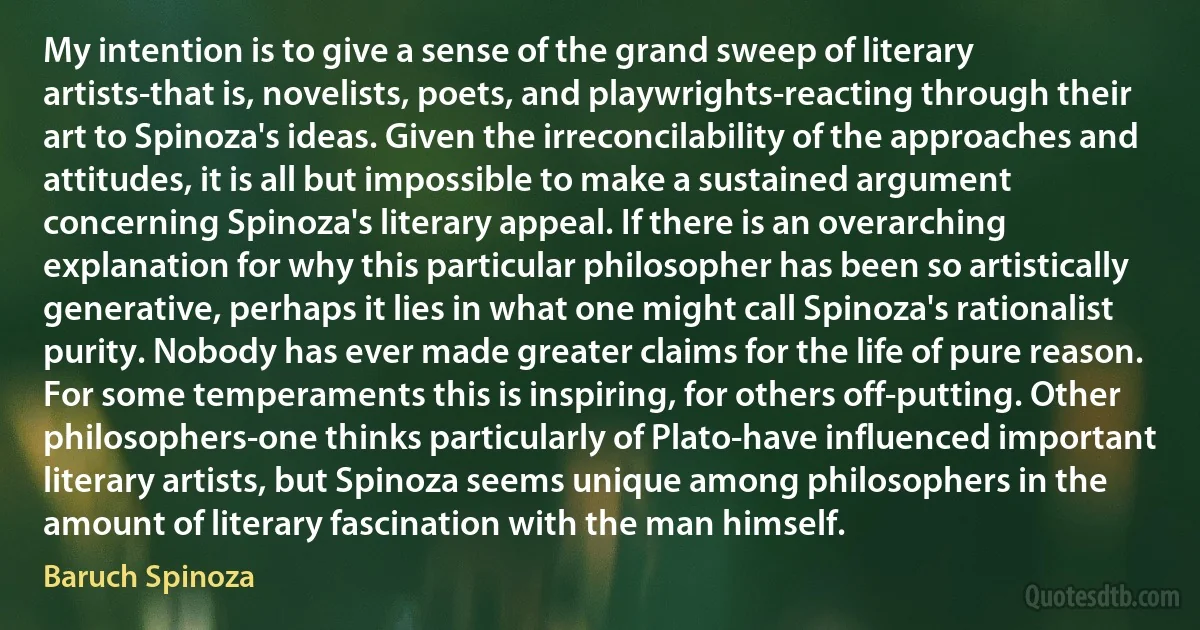
My intention is to give a sense of the grand sweep of literary artists-that is, novelists, poets, and playwrights-reacting through their art to Spinoza's ideas. Given the irreconcilability of the approaches and attitudes, it is all but impossible to make a sustained argument concerning Spinoza's literary appeal. If there is an overarching explanation for why this particular philosopher has been so artistically generative, perhaps it lies in what one might call Spinoza's rationalist purity. Nobody has ever made greater claims for the life of pure reason. For some temperaments this is inspiring, for others off-putting. Other philosophers-one thinks particularly of Plato-have influenced important literary artists, but Spinoza seems unique among philosophers in the amount of literary fascination with the man himself.
Baruch SpinozaRelated topics
argument art call fascination given impossible inspiring life man might nobody perhaps pure rationalist reason sense sweep unique others lies overarchingRelated quotes
We had to dispel the notion that the way to economic success lies through a sort of fiscal levitation. That was the abiding post-war delusion-that governments could spend and borrow their way to prosperity, and fine-tune the performance of the economy through something known pretentiously as demand management...It used to be an establishment nostrum that you need a budget deficit to get economic growth. That was the belief which lay behind the notorious letter by 364 economists in March 1981. We have given the lie to that, decisively. There can no longer be any argument about it. Everyone-or almost everyone-now accepts that the proper role of macro-economic policy is to keep downward pressure on inflation and to maintain a stable framework in which the private sector can expand.

Nigel Lawson
Before we as individuals are even conscious of our existence we have been profoundly influenced for a considerable time (since before birth) by our relationship to other individuals who have complicated histories, and are members of a society which has an infinitely more complicated and longer history than they do (and are members of it at a particular time and place in that history); and by the time we are able to make conscious choices we are already making use of categories in a language which has reached a particular degree of development through the lives of countless generations of human beings before us.... We are social creatures to the inmost centre of our being. The notion that one can begin anything at all from scratch, free from the past, or unindebted to others, could not conceivably be more wrong.

Karl Popper
...what would be most extraordinary is this, that anybody who considered the state of the Liberal party then [1896] and now should expect me voluntarily to return to the Liberal party. (Laughter.) I left the Liberal party because I found it impossible to lead it, in the main owing to the divisions to which I referred in my letter. (Hear, hear.) The Liberal party in that respect is no better now, but rather worse; and it would indeed be an extraordinary evolution of mind if, after having left the Liberal party on that ground, I were to announce my intention of voluntarily returning to it in its present condition. No, gentlemen, so far as I am concerned, I must repeat what I have said on that subject in all my speeches, that for the present, at any rate, I must proceed alone. I must plough my furrow alone.

Archibald Primrose, 5th Earl of Rosebery
If Christ were to walk in this world today, do you know what would happen to Him? He would be placed in a mental institution and given psycho-therapy, just as would His Saints. The world would crucify Him today just as it did 2000 years ago, for the world has not learned a thing, except more devious forms of hypocrisy. And what would happen if, in one of my classes at the university, I would one day tell my students that all the learning of this world is of no importance beside the duty of worshipping God, accepting the God-man who died for our sins, and preparing for the life of the world to come? They would probably laugh at me, and the university officials, if they found out, would fire me-for it is against the law to preach the Truth in our universities. We say that we live in a Christian society, but we do not: we live in a society.

Seraphim Rose
Undue cultivation of the inward or Dynamical province leads to idle, visionary, impracticable courses, and, especially in rude eras, to Superstition and Fanaticism, with their long train of baleful and well-known evils. Undue cultivation of the outward, again, though less immediately prejudicial, and even for the time productive of many palpable benefits, must, in the long-run, by destroying Moral Force, which is the parent of all other Force, prove not less certainly, and perhaps still more hopelessly, pernicious. This, we take it, is the grand characteristic of our age. By our skill in Mechanism, it has come to pass, that in the management of external things we excel all other ages; while in whatever respects the pure moral nature, in true dignity of soul and character, we are perhaps inferior to most civilised ages.

Thomas Carlyle
